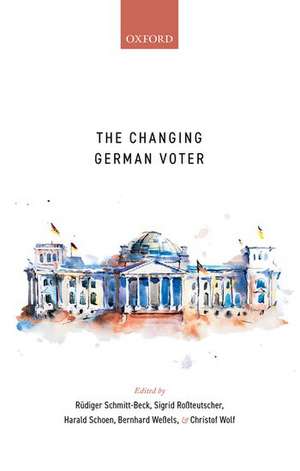The Changing German Voter
Editat de Rüdiger Schmitt-Beck, Sigrid Roßteutscher, Harald Schoen, Bernhard Weßels, Christof Wolfen Limba Engleză Hardback – 11 apr 2022
Preț: 705.21 lei
Preț vechi: 844.23 lei
-16% Nou
Puncte Express: 1058
Preț estimativ în valută:
134.94€ • 141.27$ • 111.66£
134.94€ • 141.27$ • 111.66£
Carte disponibilă
Livrare economică 04-10 martie
Preluare comenzi: 021 569.72.76
Specificații
ISBN-13: 9780198847519
ISBN-10: 0198847513
Pagini: 406
Dimensiuni: 165 x 241 x 28 mm
Greutate: 0.77 kg
Editura: OUP OXFORD
Colecția OUP Oxford
Locul publicării:Oxford, United Kingdom
ISBN-10: 0198847513
Pagini: 406
Dimensiuni: 165 x 241 x 28 mm
Greutate: 0.77 kg
Editura: OUP OXFORD
Colecția OUP Oxford
Locul publicării:Oxford, United Kingdom
Notă biografică
Rüdiger Schmitt-Beck is a Professor of Political Science and Political Sociology at the University of Mannheim. Previously he held positions as a Professor of Political Communication at the University of Duisburg-Essen and as a Scientific Director at the Center for Survey Research and Methodology Mannheim (ZUMA). From 2007 to 2019 he was founding chairperson of the German Society for Electoral Research (DGfW). At the 2009, 2013 and 2017 German Federal Elections he has served as a co-Principal Investigator of the German national election study GLES (German Longitudinal Election Study). His research appeared in journals like the British Journal of Political Science, European Journal of Political Research, Political Communication, Electoral Studies and Party Politics, and with publishers like Oxford University Press and Routledge.Sigrid Roßteutscher is Professor at the department of Social Sciences, Goethe-University Frankfurt. Since 2009 she was a Co-Director of the German Longitudinal Election Study (GLES). At present, she is chairperson of the German Society for Electoral Research (DGfW). Her research interests focus on political participation, electoral behavior, turnout, political inequality, the role of religion in politics, value orientations, and social capital. She published in journals like the European Journal of Political Research, West European Politics, American Behavioral Scientist, European Sociological Review, Political Studies, and with publishers like Oxford University Press and Routledge.Harald Schoen is a Professor of Political Science at the University of Mannheim. He served as co-Principal Investigator of the German national election study GLES. His research focuses on political behavior and political psychology. It has been published in journals like the American Political Science Review, British Journal of Political Science, European Journal of Political Research, Journal of Communication, Political Behavior, Political Psychology, and Public Opinion Quarterly, and with publishers like Oxford University Press.Bernhard Weßels is Acting Director of the research unit 'Democracy and Democatization' at the WZB Berlin Social Science Center, and Professor of Political Science at Humboldt-Universität zu Berlin. He served as a member of the planning committee of the Comparative Study of Electoral Systems (CSES) for 14 years, directed the German CSES-Studies since 1998, and was a co-principal investigator of the German national election study GLES. He has published widely in the fields of political behavior, elections, and political representation.Christof Wolf is President of GESIS Leibniz-Institute for the Social Sciences, and Professor of Sociology at the University of Mannheim. He decisively supported the long-term institutionalization inter alia of the German Longitudinal Election Study and the European Social Survey in Germany; he also served on the boards of the International Social Survey Programme and the European Values Study. His research focuses on questions of survey methodology and social stratification. He edited several handbooks and published in journals, most recently in Public Opinion Quarterly, Comparative Population Studies and Journal of Marriage and Family.
